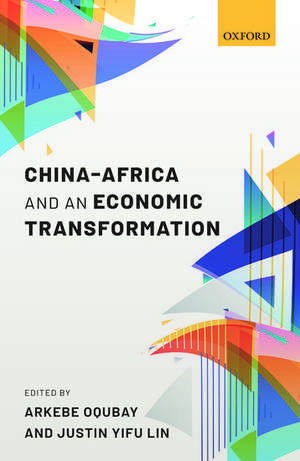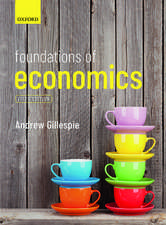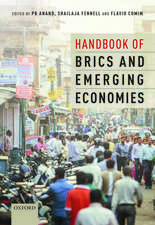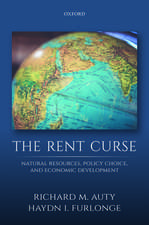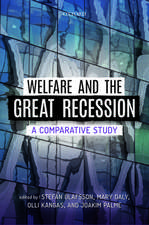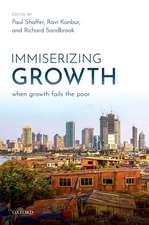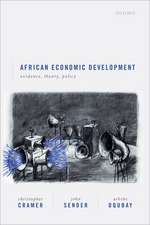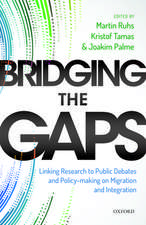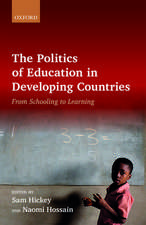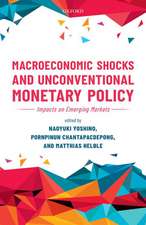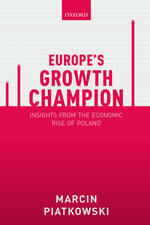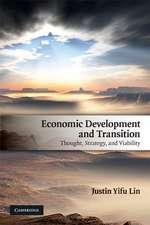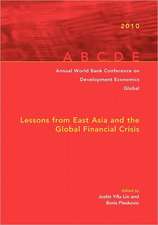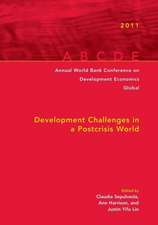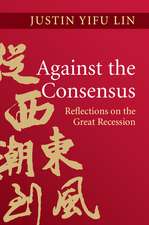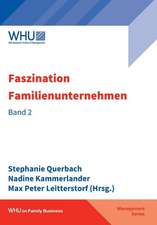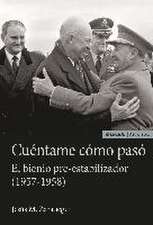China-Africa and an Economic Transformation
Editat de Arkebe Oqubay, Justin Yifu Linen Limba Engleză Hardback – 23 apr 2019
Preț: 548.47 lei
Preț vechi: 783.81 lei
-30% Nou
Puncte Express: 823
Preț estimativ în valută:
104.96€ • 113.97$ • 88.17£
104.96€ • 113.97$ • 88.17£
Carte disponibilă
Livrare economică 21-27 martie
Livrare express 15-21 martie pentru 129.61 lei
Preluare comenzi: 021 569.72.76
Specificații
ISBN-13: 9780198830504
ISBN-10: 0198830505
Pagini: 368
Dimensiuni: 163 x 240 x 25 mm
Greutate: 0.67 kg
Editura: OUP OXFORD
Colecția OUP Oxford
Locul publicării:Oxford, United Kingdom
ISBN-10: 0198830505
Pagini: 368
Dimensiuni: 163 x 240 x 25 mm
Greutate: 0.67 kg
Editura: OUP OXFORD
Colecția OUP Oxford
Locul publicării:Oxford, United Kingdom
Recenzii
This edited volume is a welcome addition to the rapidly growing academic literature on Sino-African relations.
This book's accessible up-to-date assessment on the evolving trade and investment relations between China and Africa is a welcome contribution to a field that is under-studied. The asymmetry in Africa-China relations is recognised and honestly addressed, including insights into governance arrangements. Lin and Oqubay's book is academically rigorous, and also offers immensely practical guidance to Chinese and African stakeholders on how to build this partnership going forward
This is an extremely important volume. In the chatter on China and Africa, the Chinese and Africans are the very ones often left out. The editors themselves represent a departure from "being spoken to" by a Western world with its own distinct interests. They have assembled a set of chapters of deep insights into collaboration in specific countries and which speak to a complex situation that indicates a changed world because of China and Africa.
This book comes at a critical moment in China-Africa relations, as both sides explore ways to reach their partnership potential. The 2018 FOCAC Beijing Summit launched an ambitious cooperation agenda in support of Africa's development, as encapsulated in Agenda 2063. We also agreed to advance shared priorities on the global stage. The African Union is committed to working with China on our joint objectives towards "building an even stronger community with a shared future". As we move forward, this book, which brings together various intellectual contributions, is a useful resource that captures the concrete achievements of this partnership and highlights the opportunities for even greater impact to the benefit of the two partners.
Arkebe Oqubay and Justin Yifu Lin have assembled a range of eminent scholars from across the globe to update the debate on one of Africa's partners that is here to stay: China. African countries' relations with China are evolving, solidifying, intensifying and diversifying - and they require constant learning and adaptation to understand. With this nuanced book, the authors illustrate that Chinese engagement is no panacea to African countries' development, yet the Chinese positive narrative of Africa is a fresh wind from the east that can be harnessed for home-grown strategic action. A key read for scholars and policy-makers alike!
A must read - a brilliant up-to-date review of Africa-China economic relationships and how they have evolved over the last 25 years, during the surge of China's own development. The book analyses how Africa-China relationships contrast with past and present Africa's economic relationship with the West, bringing out the positives and new opportunities of trade with China as well as the negatives and possible future problems, such as rising debt and trade deficit gaps. The chapters are analysed by a distinguished panel of well-placed authors, throwing interesting light on what Africa and others can learn from China's own accelerated development. The result is an important document which deserves the attention of national and international policymakers in Africa, the West and China as well as students and analysists following China-African relations.
If you are a public or private entrepreneur, or anyone with a vision to build more prosperous nations and businesses across the African continent in the next 50 years, then this fascinating book is a must-read... The editors and authors do a stellar job of showing how more strategic approaches by African countries, that navigate the dynamic and complex conditions, are urgently required to unlock unprecedented economic value across the continent and ensure mutual economic benefit going forward. Whether in government or the private sector, anyone with a real commitment to the sustainable and prosperous future of both, will be wise to carefully study this volume and glean actionable insights from its historically grounded and intellectually robust analysis.
A compelling and cogent work, China-Africa and an Economic Transformation offers an opportunity to engage leading policymakers and senior scholars. Cutting against clichéd representations of relations between China and Africa, the contributing authors provide fresh and original ideas about pathways to development. Oqubay and Lin's volume is timely and challenging. This book is a gem, and that's an understatement.
Africa's development and structural transformation must be premised on Africans finding the best development pathways suited to the continent's cultural, social and economic context. This interesting volume by Justin Lin and Arkebe Oqubay is among the first to explore the practical application of China's economic development model to Africa and to examine its successes and failures. It is timely, and a must read in a changing global context of multipolarity that questions what works and what does not in economic development.
China-Africa and an Economic Transformation, a book edited by Justin Yifu Lin and Arkebe Oqubay, presents a clear and important assessment of the multi-faceted interactions between China and its African trade and investment partners. Among the books many great strengths is its explicit recognition of the dynamic and changing aspects of the relationships, responding to shifts in all of these economies, and in the global context. It will become essential reading for policy makers, businesses and civil society leaders in Africa and China, but also for a global constituency concerned about the SDGs and the inclusiveness of the growth patterns in the global economy.
Capturing the diverse and dynamic nature of the economic ties between China and Africa and relating it to Africa's transformation is a novel approach of this volume. A must-read for policymakers, practitioners, and researchers working toward a healthy and vibrant economic future for the African continent.
This book's accessible up-to-date assessment on the evolving trade and investment relations between China and Africa is a welcome contribution to a field that is under-studied. The asymmetry in Africa-China relations is recognised and honestly addressed, including insights into governance arrangements. Lin and Oqubay's book is academically rigorous, and also offers immensely practical guidance to Chinese and African stakeholders on how to build this partnership going forward
This is an extremely important volume. In the chatter on China and Africa, the Chinese and Africans are the very ones often left out. The editors themselves represent a departure from "being spoken to" by a Western world with its own distinct interests. They have assembled a set of chapters of deep insights into collaboration in specific countries and which speak to a complex situation that indicates a changed world because of China and Africa.
This book comes at a critical moment in China-Africa relations, as both sides explore ways to reach their partnership potential. The 2018 FOCAC Beijing Summit launched an ambitious cooperation agenda in support of Africa's development, as encapsulated in Agenda 2063. We also agreed to advance shared priorities on the global stage. The African Union is committed to working with China on our joint objectives towards "building an even stronger community with a shared future". As we move forward, this book, which brings together various intellectual contributions, is a useful resource that captures the concrete achievements of this partnership and highlights the opportunities for even greater impact to the benefit of the two partners.
Arkebe Oqubay and Justin Yifu Lin have assembled a range of eminent scholars from across the globe to update the debate on one of Africa's partners that is here to stay: China. African countries' relations with China are evolving, solidifying, intensifying and diversifying - and they require constant learning and adaptation to understand. With this nuanced book, the authors illustrate that Chinese engagement is no panacea to African countries' development, yet the Chinese positive narrative of Africa is a fresh wind from the east that can be harnessed for home-grown strategic action. A key read for scholars and policy-makers alike!
A must read - a brilliant up-to-date review of Africa-China economic relationships and how they have evolved over the last 25 years, during the surge of China's own development. The book analyses how Africa-China relationships contrast with past and present Africa's economic relationship with the West, bringing out the positives and new opportunities of trade with China as well as the negatives and possible future problems, such as rising debt and trade deficit gaps. The chapters are analysed by a distinguished panel of well-placed authors, throwing interesting light on what Africa and others can learn from China's own accelerated development. The result is an important document which deserves the attention of national and international policymakers in Africa, the West and China as well as students and analysists following China-African relations.
If you are a public or private entrepreneur, or anyone with a vision to build more prosperous nations and businesses across the African continent in the next 50 years, then this fascinating book is a must-read... The editors and authors do a stellar job of showing how more strategic approaches by African countries, that navigate the dynamic and complex conditions, are urgently required to unlock unprecedented economic value across the continent and ensure mutual economic benefit going forward. Whether in government or the private sector, anyone with a real commitment to the sustainable and prosperous future of both, will be wise to carefully study this volume and glean actionable insights from its historically grounded and intellectually robust analysis.
A compelling and cogent work, China-Africa and an Economic Transformation offers an opportunity to engage leading policymakers and senior scholars. Cutting against clichéd representations of relations between China and Africa, the contributing authors provide fresh and original ideas about pathways to development. Oqubay and Lin's volume is timely and challenging. This book is a gem, and that's an understatement.
Africa's development and structural transformation must be premised on Africans finding the best development pathways suited to the continent's cultural, social and economic context. This interesting volume by Justin Lin and Arkebe Oqubay is among the first to explore the practical application of China's economic development model to Africa and to examine its successes and failures. It is timely, and a must read in a changing global context of multipolarity that questions what works and what does not in economic development.
China-Africa and an Economic Transformation, a book edited by Justin Yifu Lin and Arkebe Oqubay, presents a clear and important assessment of the multi-faceted interactions between China and its African trade and investment partners. Among the books many great strengths is its explicit recognition of the dynamic and changing aspects of the relationships, responding to shifts in all of these economies, and in the global context. It will become essential reading for policy makers, businesses and civil society leaders in Africa and China, but also for a global constituency concerned about the SDGs and the inclusiveness of the growth patterns in the global economy.
Capturing the diverse and dynamic nature of the economic ties between China and Africa and relating it to Africa's transformation is a novel approach of this volume. A must-read for policymakers, practitioners, and researchers working toward a healthy and vibrant economic future for the African continent.
Notă biografică
Arkebe Oqubay is a Senior Minister and Special Adviser to the Prime Minister of Ethiopia and has been at the centre of policymaking for over twenty-five years. He is a research associate at the Centre of African Studies in the University of London, and holds a PhD in development studies from SOAS, University of London. He is the former mayor of Addis Ababa and winner of the ABN Best African Mayor of 2006, and finalist for the World Mayor Award 2006. He is a recipient of the Order of the Rising Sun, Gold and Silver Star and serves as board chair of several leading public organizations and international advisory boards. His work includesMade in Africa: Industrial Policy in Ethiopia(OUP, 2015);African Economic Development: Evidence, Theory, and Policy(OUP, 2019); andChina-Africa and an Economic Transformation(2019, OUP). He was recognized as one of the 100 Most Influential Africans of 2016, and a 'leading thinker on Africa's strategic development' by the New African.Justin Yifu Lin is Dean of the Institute of New Structural Economics and Institute of South-South Cooperation and Development, and Professor and Honorary Dean of the National School of Development at Peking University. He was the Senior Vice President and Chief Economist at the World Bank, 2008-12. He is a councillor of the State Council and a Member of the Standing Committee, Chinese People's Political Consultation Conference, and is the author of more than twenty books including Beating the Odds: Jump-starting Developing Countries; Going Beyond Aid: Development Cooperation for Structural Transformation; The Quest for Prosperity: How Developing Economies Can Take Off; New Structural Economics: A Framework for Rethinking Development and Policy; Against the Consensus: Reflections on the Great Recession; and Demystifying the Chinese Economy.
